1. A Life’s Work by Rachel Cusk (Faber & Faber, 2001)
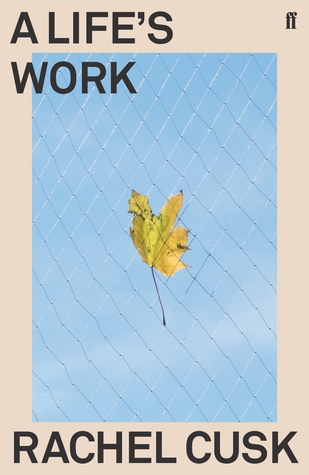
2019 was my year of Rachel Cusk, as it was I think for many people, as the conclusion to her pioneering “Faye” trilogy was published in 2018 and brought a lot of buzz. After tearing through a lot of her work, though, this memoir of becoming a mother strikes me as the most remarkable achievement. While I’m not a mother, I’ve thought a lot about parenthood over the years, and how it might change someone. (Or maybe not being a mother when most of the women in my life are is what’s made me all the more curious). How parenthood changes not only how you structure your life, how you structure your time, what you consider important, etc. which are things people usually talk about, but how it changes your sense of self – much harder to articulate—and what Cusk tackles in this memoir.
This isn’t a book exclusively for mothers, just as books about traveling around the world, or going to war, or being a chef aren’t only for readers who have done those things. I say this because it ticks me off the way the experience of motherhood is marginalized as something mainly of interest to mothers. Cusk tears down this ghettoization and the related sentimentality around motherhood and does a surgical (and hilarious) analysis of “the literature” on pregnancy and baby books. She considers the consciousness and existence of a baby on its own terms. She breaks down the complicated sense of being divided in two, a loss of a previous self, the almost-romantic obsessiveness between mother and baby… and a lot more. The world wasn’t ready for this book when it came out. Cusk was trashed as a whiner and even criticized as being a bad mother by her reviewers, and the book relegated to the “mommy war trenches,” rather than considered as a memoir of an intense human experience from a completely individual perspective, setting down thoughts and truths I don’t think have been articulated in print before.
Provenance: The American Book Center, Amsterdam
2. Eichmann in Jerusalem: A Report on the Banality of Evil by Hannah Arendt (Penguin Books, this edition 1977, original pub date is 1963)
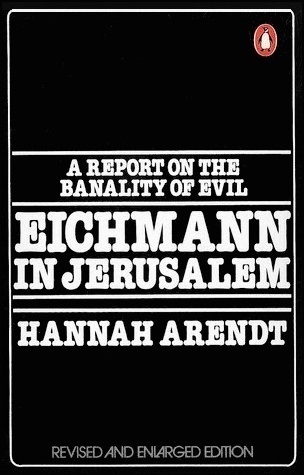
I’d heard a lot about Arendt’s work (and her name has become current again with the election of Trump), but was frankly intimidated as I don’t feel like my mind is capable of taking in anything labeled philosophy these days. I learned that this book was based on a series of controversial New Yorker articles published in the 60s from a 2012 German film called Hannah Arendt (recommended!), so I overcame my fear, thinking of this book as a very long New Yorker article.
I could write a whole essay about what I took away from this book. The short version in list form: as promised by the title, an analysis of the psychology and bureaucracy behind obedience to horrific crimes against humanity; an absolutely unwavering moral clarity, intent on seeing clearly through sentimentality and politics (she isn’t afraid to criticize the effect of these on the court proceedings for example, or to speak openly of the political motivations of Israel and Germany in the trial); the concise account of the “Final Solution” treated by country, a tremendous synthesis done in under 100 pages, revealing the sort of resistance that worked against the Nazis (in Scandinavia, for example), perceived as inexorable in other places; her style, which is acerbic, unflinching, erudite, confident.
It was Arendt’s tone that essentially what got her into trouble. Critics understandably were bothered by her being able to find anything funny about the situation, but I think this acerbic tone is a sign of her courage. Arendt demands truthfulness in language, and she refuses to hide behind platitudes. Cries of “Never Again” were already stale at the time she wrote this book (early 1960s), as the impunity so many of the perpetrators were granted in Germany and elsewhere was obvious. Sentiment and good intentions aren’t enough, only an international criminal court could serve as potential deterrent and retribution for these acts. (An institution that came to be! And for which I worked for 3 years!) It’s her faith in and respect in the power of language that allows her to see the humor in Eichmann’s use and abuse of language, his utter reliance on clichés and platitudes, especially about the worst acts committed by the Third Reich.
I used to define life difficulties as challenges to writing (or creative production, generally), but lately a different path has been apparent, writing as a way through them, although this is very, very hard, to plunge into the material. But maybe it’s a way out. This thought comes from contemplating the lives of amazing writers, who survived terrible things, but wrote through them. Writing as a way of surviving. I’m thinking of Natalia Ginzburg, who survived WWII through much hardship, including losing her beloved husband (who died imprisoned by the Fascists) and other family members; Marguerite Duras, who survived childhood with a mentally ill mother, lost a child, battled alcoholism, but wrote and made films through all of it. Arendt was a Jewish German woman who, though she fled the country before the worst was to come, but still bore witness to so much horror. To write something so clear, uncompromising (and even at times bemused), finding a way through the emotional, political, historical complications of the Holocaust (when it’s easier and understandable to retreat, to be too tired to pick up the pen) is an incredible act of strength and courage.
Origin: Boekenzolder (free book warehouse in Leiden!)
3. Outline by Rachel Cusk (Faber & Faber, 2014)
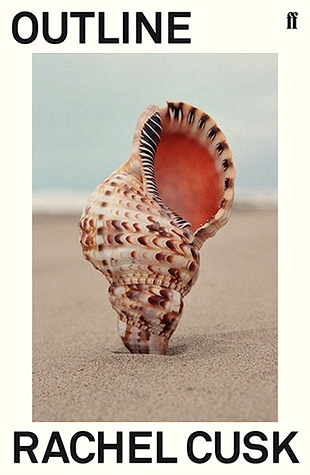
This is the first in Cusk’s so-called Faye trilogy. I loved:
– How this novel was formally experimental but still absolutely emotionally piercing. (Not much happens, it’s mostly made up of the narrator, a British writer teaching a workshop in Athens, retelling stories other people tell her.)
– How it gives you the dislocated feeling of travel, where your senses are heightened and the smallest details (a poster in a cafe) take on some yet-unknown significance.
– How Faye has a weary, post-traumatic tone, but still manages to throw shade (on the obnoxious and Irish writer, a fellow teacher, for example).
– How much it gets accomplished in 150 pages or so.
I wrote a lot more about this trilogy here.
Provenance: The American Book Center, The Hague
4. Sleepless Nights by Elizabeth Hardwick (Virago Press, 1979)
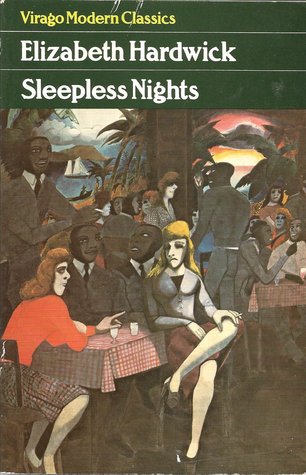
A stunning polished gem of a novella. I got something akin to Stendhal syndrome from the first chapter of this book, which sounds dramatic, but is true. I felt physically overwhelmed by how good it was at the language level, and felt something like panic that I was incapable of taking it all in at once. I read the Paris Review interview with Hardwick after reading this, and she talks about how much of her process (and her favorite part of the writing process) is revision and polishing, which gave me a better sense of how writing of this intensity and caliber is possible.
A difficult read, not because of the plotlessness, which doesn’t tend to bother me, but the relentless grimness of the episodes within. A work about the autumn of life, memory, regret, getting old. I had more to say about it here.
Superficial side note: New York Review Books, the press I’m crushing hardest on lately, recently reissued this (along with much of Hardwick’s other work) with a much better cover in their beautiful editions.
Provenance: Boekenzolder (free book warehouse in Leiden!)
5. Ways of Seeing by John Berger (Penguin, 1972)
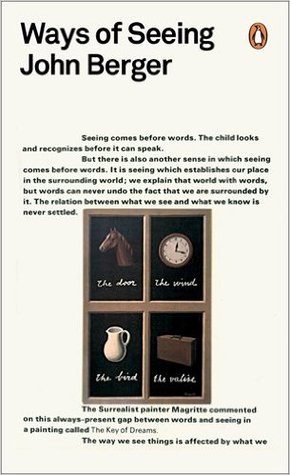
Have I mentioned I love concision? This is like a manifesto in that it’s slim and small, but you could start a revolution based on the ideas contained within, the questions it asks. For example: what was the social function of European painting? Why is the average person alienated from this direct line to our past? Why so many naked women? How do you look at a painting and how are you “supposed to” look at a painting? By art historian and novelist John Berger (oh just realized I have to put so many of his other books on my to-read, given the impact and brilliance of this one.)
This book is based on a BBC series produced in the 1970s, a little pocket paperback with black-and-white photos. A larger edition with full-color reproductions is desperately needed, given the content. Get on this, Penguin!
Provenance: Ordered from Better World Books
